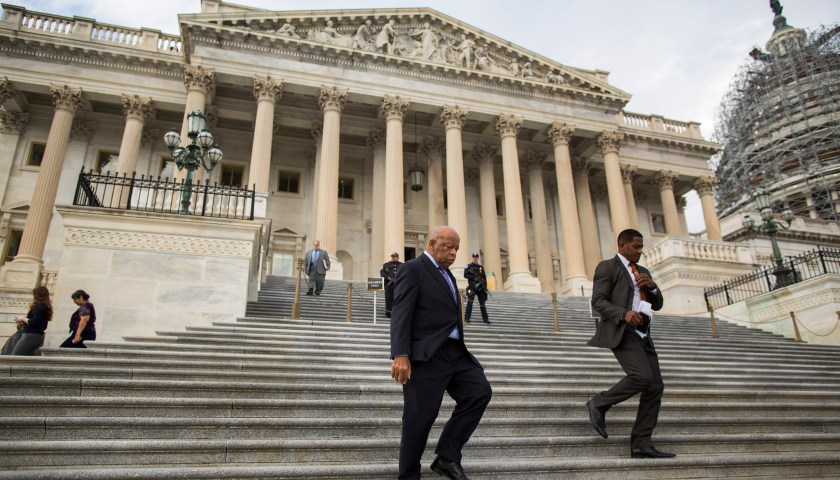Government Shutdown
Airports Anticipate Effects of Looming Government Shutdown
It's a dangerous time to be 20-something.
Congress on Friday overwhelmingly approved 'a sweeping, year-end fiscal package.'
In a morning meeting with Republicans on Friday, House Speaker John Boehner announced his resignation from Congress amidst a struggle that could end with a government…
The government shutdown in October lasted 16 days and cost at least $24 billion, and there are fears another one may be coming on Jan. 15.…
What went wrong for Republicans in their recent showdown with the president and Democrats over the debt ceiling and funding the government? “We picked the…
After 16 tense days in Washington, D.C., the government shutdown is officially over. President Barack Obama signed a bill to re-open the government and raise…
Roland Martin finds it funny that the Tea Party has not questioned Sen. Ted Cruz’s citizenship, even though the Texas lawmaker, who has an American-born mother, was…
(WASHINGTON) -- Senate leaders have reached an agreement on a compromise that would fund the government until Jan. 15 and extend the debt limit until Feb. 7. The proposal will also require income verification for people receiving health insurance premium subsidies from the federal government and it will ensure that the Treasury Department has the authority to use "extraordinary measures" to temporarily extend the debt limit, if necessary. And in a bid to potentially prevent a replay of the current crisis, the House and Senate will appoint a new committee to negotiate a budget for the remainder of the year, with their agreement due by Dec. 13. With less than a day remaining before the debt limit is reached, Congress needs to work feverishly to pass the legislation that would also end the partial government shutdown. Majority Leader Harry Reid, D-Nev., and Minority Leader Mitch McConnell, R-Ky., have worked for days to craft compromise legislation and both sides said they believe that the resulting proposal would pass the Senate and eventually be taken up in the House. But what happens there could test what little political strength House Speaker John Boehner, R-Ohio, has left. Boehner suffered a major loss Tuesday when his proposals to end the impasse twice did not appear to have enough votes from Republicans to pass on the House floor. And the Senate's proposal was not expected to include much of what conservative Republicans could support, which could make its path in the House rockier. Time is not on Congress' side, so the best prospects for the bill's passage could involve starting the process in the House of Representatives. In that scenario, Boehner would take the Senate's compromise to the House floor in a procedural move designed to speed up the process of passage because filibusters are not allowed in the House. In a second scenario, the Senate would move first and work with members to avoid objections that could slow down the bill's progress. If Boehner insists on passing legislation with a majority of his caucus, he would be forced to amend a Senate proposal. Democrats, on the other hand, have encouraged him to take up the Senate's proposal with help from Democratic votes. But such a scenario would be a damaging political defeat for a Republican House speaker who has already struggled to corral his strong-willed caucus. Either way, however, Republicans now face the reality that they will not get any major concessions from Democrats in exchange for raising the debt limit and re-opening the government. It will be an ignominious end to a saga that has ravished the party in public opinion polls and has raised doubt in financial markets that the two political parties are capable of resolving their differences. Neither the Senate plan nor the House's short-lived proposal defunded or postponed President Obama's health care law, which was the center of tea party Republican demands for re-opening the government. And even more modest concessions put forward by Boehner -- for example to repeal the unpopular tax on medical devices and repeal government subsidies for congressional and administration staffers' health care -- could not get enough Republican support to pass. All eyes will be on financial markets Wednesday as the clock ticks closer to zero hour for the debt limit. Asked whether there are concerns about how the markets will react tomorrow, Sen. Chuck Schumer, D-N.Y., suggested that they would be heartened by signs of progress. "Obviously we want to get this done as quickly as possible for the good of the country, the markets, etc but the markets should know that right now it's not done yet but we're on a good track," Schumer said Tuesday night. Copyright 2013 ABC News Radio
VIA WOLDCNEWS.com Senate leaders announced today that they have reached a deal to end the government shutdown in time to avoid a possible U.S. default. Details on the agreement that was formally announced on the senate floor at noon today are scant but CNN reports that the government could open as soon as midnight if […]
Really, aren’t you just over it already? Aren’t you over giving people who could not care less about you the power to decide what you…






















